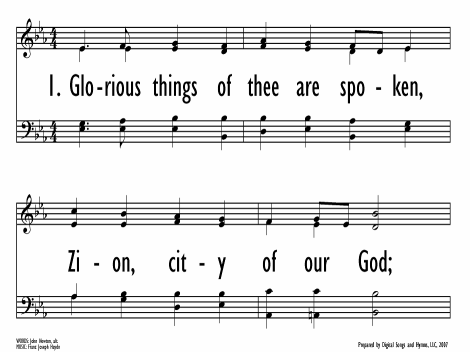- |
User Links
399
Bless the LORD, O Saints and Servants
Hymn Information
- First Line
- Bless the LORD, O saints and servants
- Author
- Michael Morgan
- Tune Name
- AUSTRIAN HYMN
- Composer
- Franz Joseph Haydn, 1732-1809 (1797)
- Topic
- Praise of God · Time
Copyright Information
- Text Copyright
- © 2011 Michael Morgan, admin. Faith Alive Resources
- Tune Copyright
- Public Domain
- Reprint/Projection Information
- Words: Permitted with a license from CCLI.com or from OneLicense.net. If you do not own one of these licenses, please contact the copyright holder for permission.
- Music: The Music is in the Public Domain; you do not need permission to project or reprint the Music
Scripture References
Confessions and Statements of Faith References
Further Reflections on Confessions and Statements of Faith References
For the source of the harvest, God’s children are called to look to God who with his powerful hand upholds all things, even “...leaf and blade, rain and drought, fruitful and lean years, food and drink...” (Heidelberg Catechism, Lord’s Day 10, Question and Answer 27). As a response for the harvest, God’s people are called to give him thanks.
The fourth petition of the Lord’s Prayer also expresses this dependence on God as provider (Heidelberg Catechism, Lord’s Day 50, Question and Answer 125).
399
Bless the LORD, O Saints and Servants
Additional Prayers
Compassionate God,
your ears are open to the cries of the poor,
and you come to the aid of the needy.
Tune our hearts toward the least of these,
that we may meet our Lord Jesus in them
and that the great reversal of your kingdom may come. Amen.
your ears are open to the cries of the poor,
and you come to the aid of the needy.
Tune our hearts toward the least of these,
that we may meet our Lord Jesus in them
and that the great reversal of your kingdom may come. Amen.
—
Psalms for All Seasons (http://www.psalmsforallseasons.org)
399
Bless the LORD, O Saints and Servants
Tune Information
- Name
- AUSTRIAN HYMN
- Key
- E♭ Major
- Meter
- 8.7.8.7 D
Recordings
399
Bless the LORD, O Saints and Servants
Hymn Story/Background
The text is my original setting of Psalm 113 in the Psalter for Christian Worship. The Psalter for Christian Worship (1999; revised, 2010) was written for my congregation at Central Presbyterian Church in Atlanta as a means of reclaiming the Reformed tradition of singing metrical Psalms in our worship.
The familiar tune by Haydn, AUSTRIAN HYMN, lends a dignified tone to the Psalm text which celebrates God’s matchless glory.
—
Michael Morgan
Author Information
Michael Morgan (b. 1948) is a church musician, Psalm scholar, and collector of English Bibles and Psalters from Atlanta, Georgia. After almost 40 years, he now serves as Organist Emeritus for Atlanta’s historic Central Presbyterian Church, and as Seminary Musician at Columbia Theological Seminary. He holds degrees from Florida State University and Atlanta University, and did post-graduate study with composer Richard Purvis in San Francisco. He has played recitals, worship services, and master classes across the U. S., and in England, France, Spain, Switzerland, and Germany. He is author of the Psalter for Christian Worship , and a regular contributor in the field of psalmody (most recently to the Reformed collections Psalms for All Seasons and Lift Up Your Hearts, and the new Presbyterian hymnal, Glory to God).
—
Michael Morgan
Composer Information
Franz Joseph Haydn’s (b. Rohrau, Austria, 1732; d. Vienna, Austria, 1809) life was relatively uneventful, but his artistic legacy was truly astounding. He began his musical career as a choirboy in St. Stephen's Cathedral, Vienna, spent some years in that city making a precarious living as a music teacher and composer, and then served as music director for the Esterhazy family from 1761 to 1790. Haydn became a most productive and widely respected composer of symphonies, chamber music, and piano sonatas. In his retirement years he took two extended tours to England, which resulted in his "London" symphonies and (because of G. F. Handel's influence) in oratorios. Haydn's church music includes six great Masses and a few original hymn tunes. Hymnal editors have also arranged hymn tunes from various themes in Haydn's music.
—
Bert Polman
Suggestions or corrections? Contact us


 My Starred Hymns
My Starred Hymns






